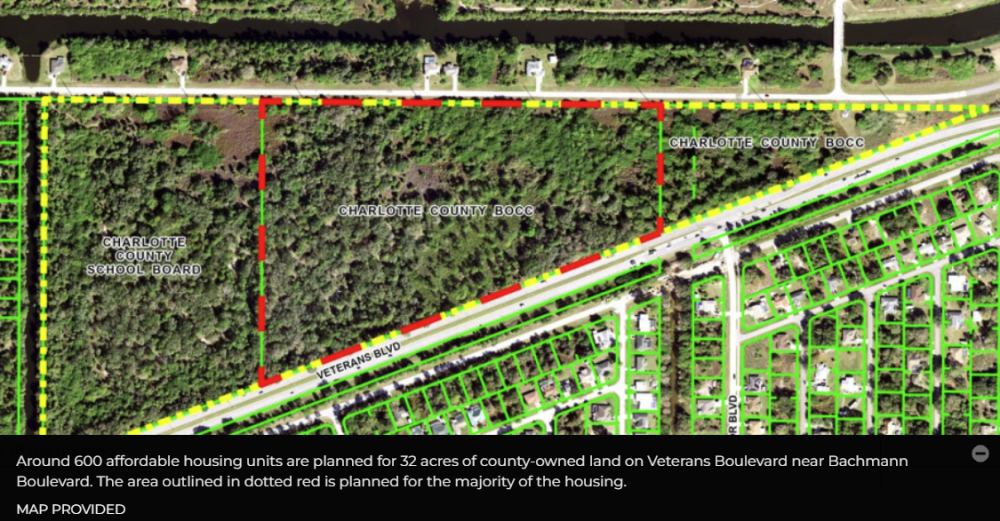Affordable housing moves forward
September 19th, 2022
By DANIEL SUTPHIN, STAFF WRITER - Charlotte Sun
Email: daniel.sutphin@yoursun.com

AFFORDABLE HOUSING MOVES FORWARD
AROUND 600 UNITS PLANNED FOR VETERANS BLVD
PORT CHARLOTTE — Around 600 affordable housing units are planned for 32 acres of Charlotte County-owned land on Veterans Boulevard near Bachmann Boulevard. At Tuesday’s meeting, a majority of the county commissioners approved the sale of the property to Palladium Investment Company, of New Jersey, for 600 multifamily rental units at varying levels of affordability. Based on the contract, 40 units will be available in a not-to-exceed 60% rate of area median income, or around $45,600. Another 320 units will be listed at a not-to- exceed AMI rate of 80%, or $60,800. Another 40 units will be listed at a not-to exceed AMI rate of 100%, or $76,000, with another 200 units to be listed at a not-to exceed rate of 140%, or $106,400. “I wanted to make sure to put this in perspective that 140% AMI is our workers in this area,” Assistant County Administrator Claire Jubb said. “It’s what our Charlotte County Sheriff’s deputies … two sheriff’s deputies at $50,000 … I just really wanted to put it in perspective.”
Charlotte County officials say a lack of affordable housing makes it hard to retain employees. Commission Vice Chair Christopher Constance was the only one to vote against the sale approval because he wanted there to be more incentive for Charlotte County employees. “I discussed (with Palladium reps) the fact we have a need for health care workers to be involved and that there were health care institutions involved and interested in working out a situation with them (for housing),” he said. He noted firefighters, sheriff’s deputies and teachers fit into those ranges. “We’re going to basically create 600 units (for residents) that are then going to hop on the highway and we are a bedroom community for Sarasota or Fort Myers,” he said.
Commissioner Stephen R. Deutsch said the developer told him they were willing to try to work with local employers such as CCSO and Charlotte County Fire and EMS, as well as local hospitals. “I felt that my conclusions after the discussion is that they were open and willing to discuss those issues and didn’t reject anything,” he said. “They saw possibilities, and I’m comfortable supporting this.” Another concern for Constance was that the developer might promise to provide affordable housing only to back out later. “We’ve had bad deals in the past and it just doesn’t seem like we ever have anything with teeth to make sure that there are specific things that occur,” Constance said. “Once bitten, twice shy. We’ve had issues with another group that has not performed and these types of deals always concern me.” Attorney Geri Waksler, Palladium’s representative, said the contract for maintaining affordability was negotiated to last 30 years. If the developer falls out of compliance, it could be subject to lawsuits.
Jubb confirmed that would be the case. “There is a land use restriction agreement that goes with this to make sure those terms of affordability and unit accounts are maintained for the 30 years,” Jubb added. In return for making those units available under the current AMI, the county will waive impact fees, saving the developer $2.6 to $3.1 million. Commissioner Joe Tiseo said it’s a win-win for Charlotte County. “Think about the economic impact,” he said. “That’s $200 million when it’s done is going to go on the tax rolls.” The economic impact is an analysis that examines the effect of an event on the local economy based on changes in business revenue, business profits, personal wages and jobs, among other things. “The (current) vacant property … you know how much we are getting from that right now?” Tiseo said. “A big fat zero. Think about in two years, $200 million worth of assessed value, or ultimate assessed value going into the tax rolls. “This is a win-win on so many levels,” he added. “It’s a win-win for people searching for affordability. It’s a win-win because we are expanding the tax base in an appropriate spot and taking a piece of unproductive property and getting it on the tax rolls. That’s one of the goals of the board is to have a healthy, vibrant economy. There are way more wins in this thing than negatives.”

